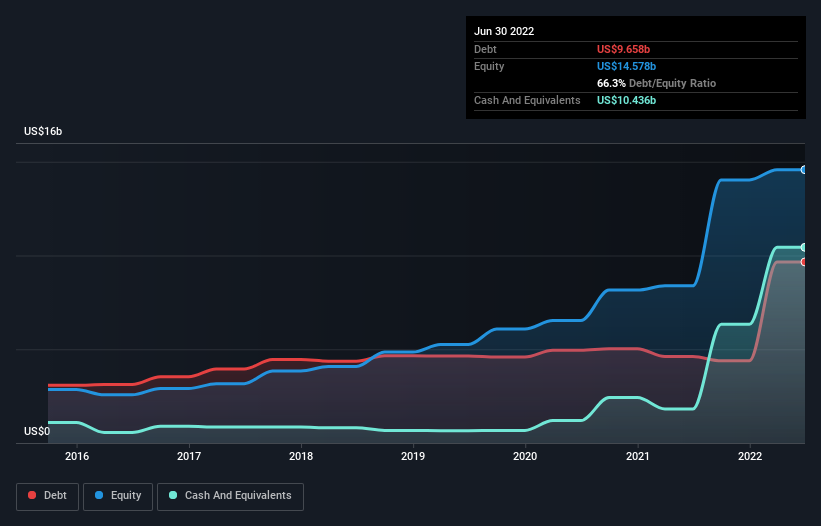Does CSL (ASX:CSL) Have A Healthy Balance Sheet?
Warren Buffett famously said, 'Volatility is far from synonymous with risk.' So it seems the smart money knows that debt - which is usually involved in bankruptcies - is a very important factor, when you assess how risky a company is. As with many other companies CSL Limited (ASX:CSL) makes use of debt. But is this debt a concern to shareholders?
What Risk Does Debt Bring?
Debt is a tool to help businesses grow, but if a business is incapable of paying off its lenders, then it exists at their mercy. Part and parcel of capitalism is the process of 'creative destruction' where failed businesses are mercilessly liquidated by their bankers. While that is not too common, we often do see indebted companies permanently diluting shareholders because lenders force them to raise capital at a distressed price. Of course, plenty of companies use debt to fund growth, without any negative consequences. The first thing to do when considering how much debt a business uses is to look at its cash and debt together.
Check out our latest analysis for CSL
What Is CSL's Net Debt?
You can click the graphic below for the historical numbers, but it shows that as of June 2022 CSL had US$9.66b of debt, an increase on US$4.61b, over one year. But on the other hand it also has US$10.4b in cash, leading to a US$778.6m net cash position.
How Healthy Is CSL's Balance Sheet?
According to the last reported balance sheet, CSL had liabilities of US$7.11b due within 12 months, and liabilities of US$6.66b due beyond 12 months. Offsetting these obligations, it had cash of US$10.4b as well as receivables valued at US$1.69b due within 12 months. So its liabilities outweigh the sum of its cash and (near-term) receivables by US$1.65b.
Having regard to CSL's size, it seems that its liquid assets are well balanced with its total liabilities. So it's very unlikely that the US$99.7b company is short on cash, but still worth keeping an eye on the balance sheet. While it does have liabilities worth noting, CSL also has more cash than debt, so we're pretty confident it can manage its debt safely.
On the other hand, CSL saw its EBIT drop by 6.5% in the last twelve months. That sort of decline, if sustained, will obviously make debt harder to handle. There's no doubt that we learn most about debt from the balance sheet. But ultimately the future profitability of the business will decide if CSL can strengthen its balance sheet over time. So if you're focused on the future you can check out this free report showing analyst profit forecasts.
But our final consideration is also important, because a company cannot pay debt with paper profits; it needs cold hard cash. While CSL has net cash on its balance sheet, it's still worth taking a look at its ability to convert earnings before interest and tax (EBIT) to free cash flow, to help us understand how quickly it is building (or eroding) that cash balance. Over the most recent three years, CSL recorded free cash flow worth 51% of its EBIT, which is around normal, given free cash flow excludes interest and tax. This cold hard cash means it can reduce its debt when it wants to.
Summing Up
We could understand if investors are concerned about CSL's liabilities, but we can be reassured by the fact it has has net cash of US$778.6m. So we don't have any problem with CSL's use of debt. There's no doubt that we learn most about debt from the balance sheet. But ultimately, every company can contain risks that exist outside of the balance sheet. Case in point: We've spotted 1 warning sign for CSL you should be aware of.
If you're interested in investing in businesses that can grow profits without the burden of debt, then check out this free list of growing businesses that have net cash on the balance sheet.
Have feedback on this article? Concerned about the content? Get in touch with us directly. Alternatively, email editorial-team (at) simplywallst.com.
This article by Simply Wall St is general in nature. We provide commentary based on historical data and analyst forecasts only using an unbiased methodology and our articles are not intended to be financial advice. It does not constitute a recommendation to buy or sell any stock, and does not take account of your objectives, or your financial situation. We aim to bring you long-term focused analysis driven by fundamental data. Note that our analysis may not factor in the latest price-sensitive company announcements or qualitative material. Simply Wall St has no position in any stocks mentioned.
Join A Paid User Research Session
You’ll receive a US$30 Amazon Gift card for 1 hour of your time while helping us build better investing tools for the individual investors like yourself. Sign up here

 Yahoo Finance
Yahoo Finance 
